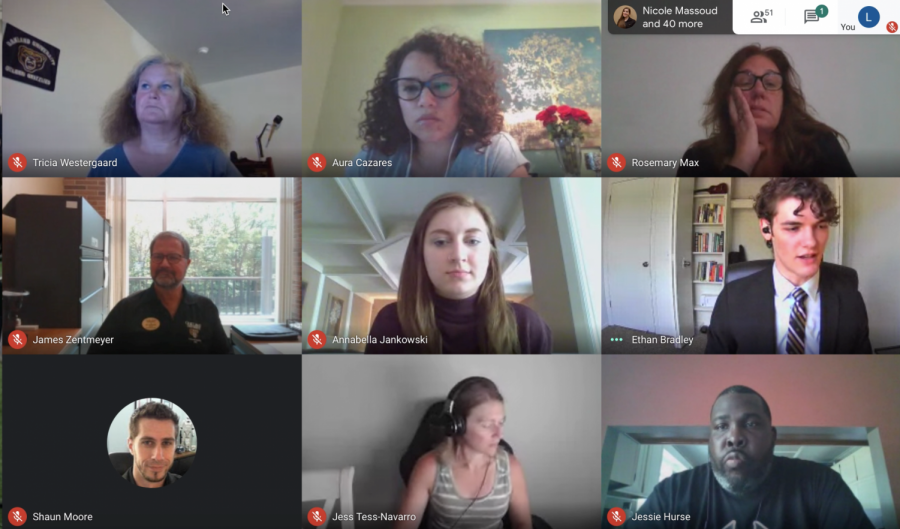Campus life, COVID-19 relief addressed at July concerns forum
Student Body President, Ethan Bradley, moderates a virtual concern forum in July 2020 to prepare for the fall semester. The meeting focused on campus life and financial aid for the upcoming fall semester. Photo by Lauren Karmo.
From student activities to financial struggles, Oakland University Student Congress’s (OUSC) student concerns forum allowed university administration to address a wide range of topics on Tuesday, July 14.
While previous forums have mostly focused on online and hybrid learning in the upcoming fall semester, many students have now been wondering what campus life will look like with questions about support services, activities and amenities dominated the dialogue.
Student activities, services take a hybrid approach
Jean Ann Miller, senior director of the Office of Student Involvement (OSI), mentioned that welcome week plans have been adjusted to include both virtual and in-person events and will take advantage of outdoor spaces.
“We have a hybrid plan for our student activities that will be both in person — as much as possible — but also virtual and live streaming,” Miller said. “We plan to do many activities during welcome week. Some traditional ones may end up being more virtual — like carnival is going to be happening in a live version and also a virtual version throughout the entire day.”
Club sports have been devising similar safety plans to use outdoor space to organize activities, but competitions are still in question due to potential travel restrictions. University Recreation and Well-Being hopes club sports as well as virtual classes and events will keep the OU community active and involved until the rec center opens.
The rec center is being reorganized to space out equipment and planning to adjust hours and occupancy limits in accordance with government restrictions when it reopens. The same goes for Kresge Library and the Oakland Center.
According to Greg Jordan, director of University Recreation and Well-Being, while he doesn’t see many intramural sports happening this fall, e-sports, virtual fitness classes and minimal-to-no contact sports may be in the cards.
“We’re still going to have a virtual presence, as well as probably some non-traditional things because I don’t see intramural flag football, but I certainly see intramural kickball or intramural wiffleball — those kinds of activities happening this fall,” Jordan said.
The Graham Health Center advised anyone who is worried about their physical health to talk with their physician before deciding to return to campus housing or face-to-face classes and events. They are offering COVID-19 testing for anyone experiencing symptoms, as well as antibody testing and both in-person and telehealth visits.
Housing addresses move-in, renewal of awards
In addition to student activities, housing has been adjusting move-in and visiting policies. While early move-in will still be available, housing director James Zentmeyer warns students to expect a more low-key and fast-moving event than the usual long lines and “parties” of a normal move-in.
Move-in this fall will take place over five days instead of three, and the six check-in locations will be organized so there are no more than 10 students checking in per hour.
The university has acknowledged the risks of living on campus for students and has allowed for any housing contracts to be canceled with no penalty. Students with housing awards will be able to opt out of on-campus living without losing their scholarships, but the semester will still count regardless of the student’s choice.
“All the different factors that can take into account are probably more than we can imagine right now — so we remain flexible with our customers and have to give them the most flexibility to handle this difficult situation as possible,” Zentmeyer said. “Besides, we want you to come back again next year.”
Internship requirements called into question
In addition to campus life and wellness, many were concerned with fulfilling internship requirements before graduation. With the economy taking a hit since March, internships — especially in hands-on disciplines — have been few and far between.
Registrar Tricia Westergaard suggests speaking to department chairs and internship advisers and coordinators to get better access to opportunities and find ways to stay on track for graduation.
Financial support, COVID-19 relief continued
Financial aid and relief is a recurring topic at the concern forums, as students continue to wonder how the university will support them during COVID-19 economic hardships. Student Financial Services reminded everyone to file their free application for federal student aid (FAFSA) to be eligible for Coronavirus Aid, Relief and Economic Security (CARES) Act funding.
“We also have the possibility for students, if you have already filed your 2021 FAFSA, that’s using income from two years ago, you can submit information telling us — Student Financial Services — that your family or your financial circumstances have changed since filing the FAFSA and we will review that information and see if we can make changes to your FAFSA data in hopes of making you eligible or more eligible for more aid and better types of financial aid,” said Nancy Fetzer, associate director of Student Financial Services.
In addition to CARES Act funding, OU is offering its own COVID-19 relief fund through the dean of students website for those who are ineligible for other types of relief.
The next OUSC student concerns forum will take place in August with the exact date to be announced.







